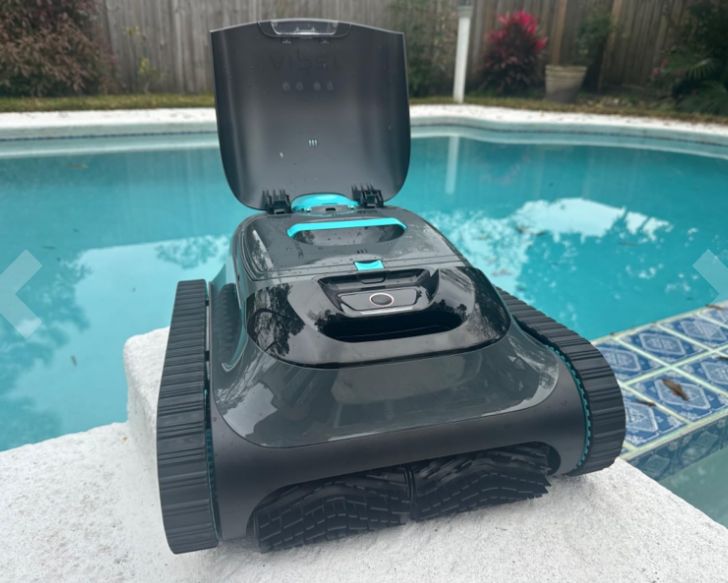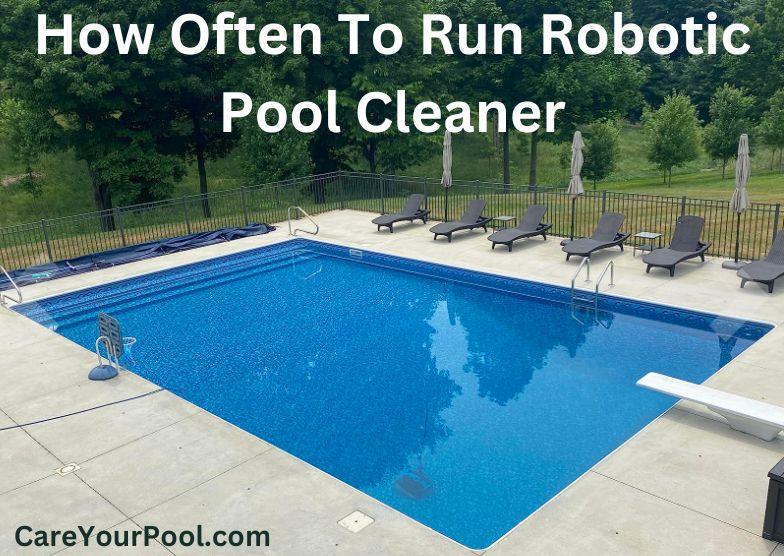Maintaining a clean and healthy pool requires regular cleaning, and robotic pool cleaners have become a popular choice for pool owners. “How often to run Robotic Pool Cleaner?” is one of the most often requested queries by pool owners.
While the answer varies depending on various aspects such as pool usage, debris load, and filtration system, a basic rule of thumb for residential pools is to run the robotic pool cleaning at least once a week. Running the cleaner twice or three times a week may be essential for pools that are used more often or have a greater debris load.
In this blog article, we’ll look at the elements that might influence how frequently you should run your robotic pool cleaner and present a chart to assist you to figure out the best frequency for your pool.
How a Robotic Pool Cleaner Works?
A robotic pool cleaner is an automated pool cleaner that cleans your pool thoroughly by navigating it with innovative technologies.
The gadget is electrically powered and includes an internal motor that operates a series of brushes, scrubbers, and filters that work together to scrape and remove dirt, debris, and algae from the surface and walls of your pool.
The robotic pool cleaning is self-contained, which means it does not require additional pipes or pumps. It includes an integrated filtration system that collects and stores material in a filter canister or bag.
The robot also utilizes sensors to map the size and shape of your pool and navigate around obstructions to ensure that every inch of your pool is cleaned.
Many robotic pool cleaners can also be programmed to run on a timer or remotely controlled via a mobile app. Overall, a robotic pool cleaner is a quick and easy solution to maintain your pool gleaming clean with little work.
For a household pool, a robotic pool cleaning should be operated once or twice a week, however, this may vary depending on specific conditions. For the best performance and lifespan of the cleaner, it is critical to follow the manufacturer’s instructions and recommendations.
How often do you use a Robotic Pool Cleaner?
One of the most common questions pool owners have about robotic pool cleaners is how frequently they should run the cleaner. While the answer to this question may vary based on the circumstances of the individual, there are some broad rules that can be followed.
Experts recommend operating your robotic pool cleaning at least once a week, but it may be required to run it more regularly in some circumstances. Pool usage, weather conditions, and the presence of trees or other debris in the surrounding area can all have an effect on how frequently you need to run your pool cleaner.
Ultimately, the best way to determine the ideal cleaning frequency for your pool is to experiment with different schedules until you find one that works best for your specific situation. Here are some factors that may affect how often you should run your robotic pool cleaner:
- Pool usage: The more you use your pool, the more dirt collects, necessitating more regular cleaning.
- Environmental factors: If your pool is in a location with a lot of trees or foliage, it will likely accumulate more leaves and debris, necessitating more regular cleanings.
- Weather conditions: Stormy weather or high winds can cause more debris to fall into your pool, necessitating additional cleanings.
- Pool size and shape: Larger and more complexly formed pools may necessitate more time for the cleaner to thoroughly clean all sections.
- Cleaner type: Different robotic pool cleaners have varying cleaning capacities and may need more or less time to clean your pool.
| Factor | Frequency |
| Pool usage | Once per week for light use; twice per week for heavy use |
| Debris load | Once per day for heavy debris; once per week for light debris |
| Pool size | At least once per week for small pools; twice per week for larger pools |
| Water temperature | Once per week in cooler temperatures; twice per week in warmer temperatures |
| Filtration system | Once per week if the filter is working properly; twice per week if the filter is not functioning optimally |
| Location | Once per week in areas with high pollen, dust or other environmental factors; twice per week in coastal areas with saltwater |
Based on several parameters such as pool size, usage, and debris type, the table gives a basic estimate for how frequently a robotic pool cleaning should be performed.
It advises that a robotic pool cleaning be used more regularly in bigger pools with heavy usage and a higher amount of debris, and less frequently in smaller pools with little usage and minimum debris.
However, based on individual conditions, the frequency may vary, and pool owners should monitor the cleanliness of their pool and alter the running schedule accordingly.
But always keep in mind and be very cautious about the fact that you cannot leave your Robotic Pool Cleaner in the pool. See what happens when you leave your Robotic Pool Cleaner in the pool.
How long do Robotic Pool Cleaners last?

According to industry experts, with appropriate care and regular maintenance, a well-maintained robotic pool cleaner may survive for up to 5 years or more.
However, factors such as frequency of usage, pool size and type, and water chemistry can all have an impact on the longevity of a robotic pool cleaner.
Running the robotic pool cleaner too frequently can cause early wear and tear on the motor and components, whereas occasional use can create buildup and clogging in the filtration system. To extend the life of your robotic pool cleaner, select the proper combination of frequency and maintenance.
| Type of Robotic Pool Cleaner | Average Lifespan |
| Entry-level models | 2-3 years |
| Mid-range models | 4-5 years |
| High-end models | 6+ years |
Note that the actual lifespan of a robotic pool cleaner can vary depending on factors such as frequency of use, maintenance, and the quality of the cleaner.
Final Words
Finally, keeping your pool clean is critical for its durability and your enjoyment. A robotic pool cleaner is an excellent investment that may assist you in meeting this aim with minimum effort.
The frequency with which you should operate your robotic pool cleaner is determined by various factors, including pool usage, weather conditions, and the cleaner’s lifespan.
By following the instructions in this post, you can establish the optimum cleaning plan for your pool and keep it in outstanding shape for years to come. Remember that a well-kept pool is a happy pool!
And if you have any other questions related to pool cleaners like “How do suction pool cleaners work?” etc. you can go through our website. We hope it will be of your help with the swimming pool cleaning.
Read more, Learn more:
- How to raise bromine level in pool?
- What does bromine do in pool?
- How to lower bromine in pool?
